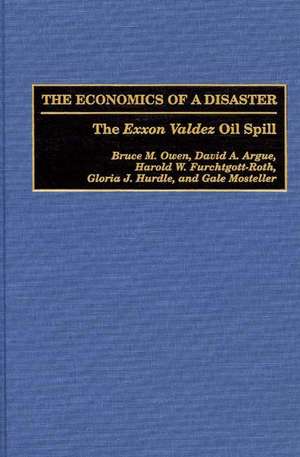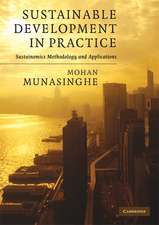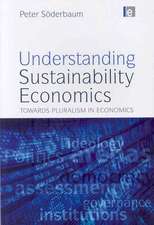The Economics of a Disaster: The Exxon Valdez Oil Spill
Autor Bruce M. Owen, David A. Argue, Harold W. Furchtgott Roth, Gloria J. Hurdle, Gale Mostelleren Limba Engleză Hardback – 19 oct 1995 – vârsta până la 17 ani
Preț: 556.94 lei
Preț vechi: 798.90 lei
-30% Nou
Puncte Express: 835
Preț estimativ în valută:
106.57€ • 113.96$ • 88.86£
106.57€ • 113.96$ • 88.86£
Carte tipărită la comandă
Livrare economică 17 aprilie-01 mai
Preluare comenzi: 021 569.72.76
Specificații
ISBN-13: 9780899309873
ISBN-10: 0899309879
Pagini: 216
Dimensiuni: 156 x 235 x 16 mm
Greutate: 0.49 kg
Ediția:New.
Editura: Bloomsbury Publishing
Colecția Praeger
Locul publicării:New York, United States
ISBN-10: 0899309879
Pagini: 216
Dimensiuni: 156 x 235 x 16 mm
Greutate: 0.49 kg
Ediția:New.
Editura: Bloomsbury Publishing
Colecția Praeger
Locul publicării:New York, United States
Notă biografică
BRUCE M. OWEN is President of Economists Incorporated, a Washington, D.C. consulting firm specializing in antitrust and regulatory issues. He also teaches a seminar on law and economics at Stanford University's Washington campus. Owen has been an expert witness in a number of antitrust and regulatory proceedings, including United States vs. AT&T. In 1992, he headed a World Bank task force that advised the government of Argentina in drafting a new antitrust law. He was also chief economist of the Antitrust Division of the U.S. Department of Justice in the Carter administration, and of the White House Office of Telecommunications Policy in the Nixon administration. Owen is the coauthor of Electric Utility Mergers: Principles of Antitrust Analysis1994).DAVID A. ARGUE is a senior economist at Economists Incorporated in Washington, D.C. While at Economists Incorporated, he has researched many issues in environmental economics. Previously, he was an economist at the Center for Public Service in Charlottesville, Virginia and taught undergraduate economics.HAROLD W. FURCHTGOTT-ROTH is a senior economist at Economists Incorporated in Washington, D.C. He was formerly a research fellow at the Brookings Institution and a member of the research staff at the Center for Naval Analyses. His publications include International Trade in Computer Software (Quorum, 1993).GLORIA J. HURDLE, prior to joining Economists Incorporated in Washington, D.C., spent over 13 years as an economist in the Antitrust Division of the U.S. Department of Justice on the Antitrust Subcommittee of the U.S. Senate, and teaching at the Colorado College, the Eastern Michigan University, and the University of Michigan. She has authored or coauthored a number of articles related to industry structure. She has also testified before the U.S. District Court, the Department of Transportation and the Canadian Competition Tribunal. Her work primarily involves transportation, agriculture, and energy.GALE MOSTELLER, during her years at Economists Incorporated in Washington, D.C., has provided economic analysis and litigation support to law firms, corporations, and government agencies concerning antitrust issues, transfer pricing, FIFRA data compensation and economic damages from false advertising, securities fraud, and contract breach.
Cuprins
Figures and TablesAcknowledgmentsIntroductionThe Effect of Disaster on Prices of Goods and Services: An Economic FrameworkMeasuring the Effect of the Exxon Valdez Oil Spill on Alaskan Seafood PricesIndustry BackgroundQualitative Evidence Concerning Price EffectsJapanese Consumer DemandSalmon Benchmark StudiesSalmon Reduced Form StudySalmon Processor PricesNon-salmon Species StudiesSupply EffectsFishing Permit ValuesSummary of ResultsConclusionAppendix 1: A Brief Description of Statistical TerminologyAppendix 2: Modeling Japanese Consumer DemandAppendix 3: Reduced Form Model for Alaskan SalmonAppendix 4: Supply EffectsSelected BibliographyIndex












